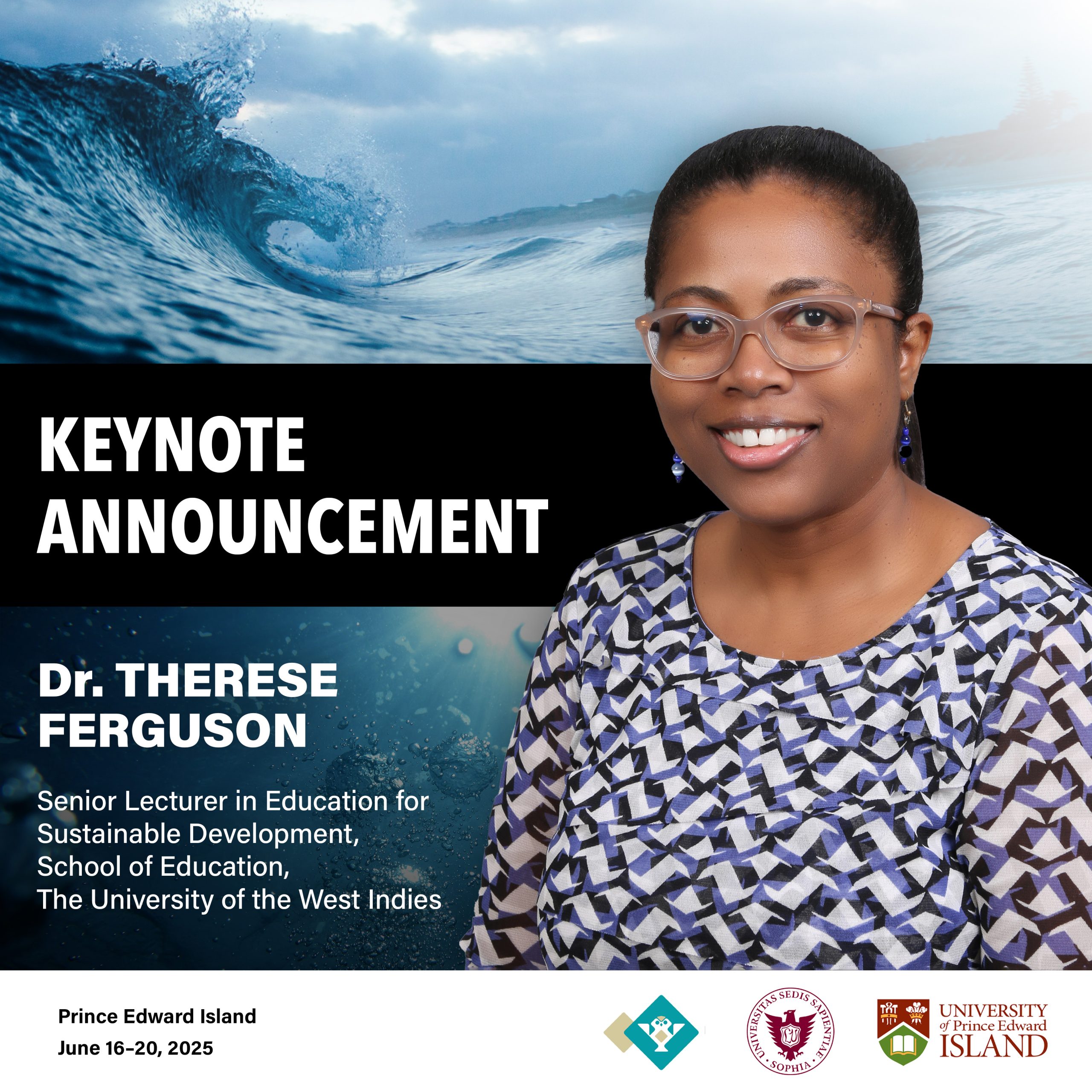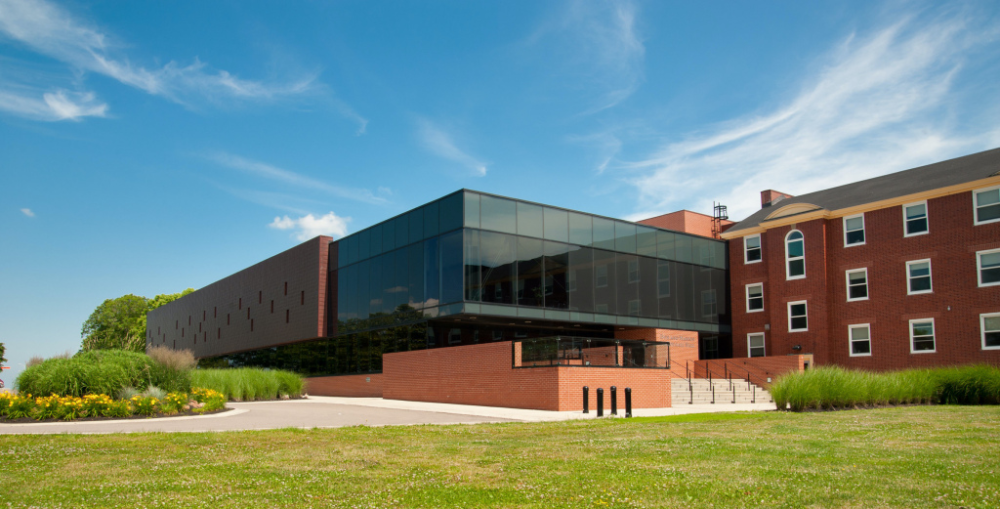
Date: June 16 – 20, 2025
Location: Don & Marion McDougall Hall, University of Prince Edward Island, Charlottetown
Co-Hosted by: University of Prince Edward Island, The University of Aruba, Sophia University
Registration | Travel & Accommodations | Speakers | Program & Schedule | Book of Abstracts
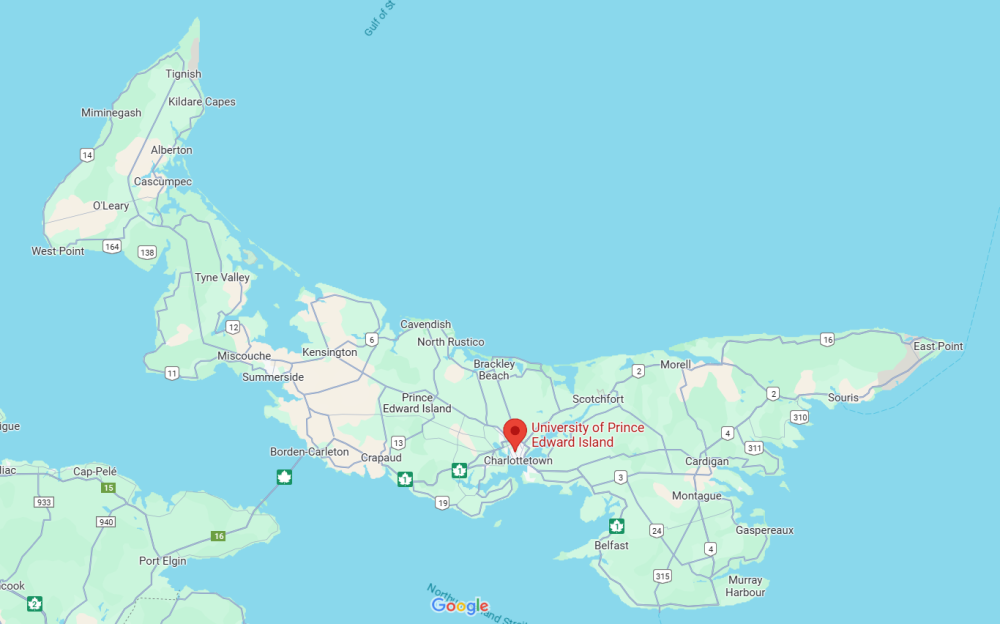
Please visit the drop-down menus below to learn more about the conference. We look forward to seeing you in June!
Registration
Registration for Turning the Tide 2025 is now closed, thank you to everyone who joined us in PEI! We hope to see you all at Turning the Tide 2027!
REGISTRATION FEES:
IN-PERSON
- FULL RATE: CA$475 | US$340* (April 16, 2025 onwards)
- VIRTUAL FULL RATE: CA$125 | US$85
- IN-PERSON DAY RATE: CA$125 | US$85
- STUDENT: CA$200 | US$140
- STUDENT VIRTUAL: CA$55.00 | US$40
NOTE: In person conference fees (early bird, full, and student) include nutrition breaks, lunches, opening reception, and all materials.
Announcements
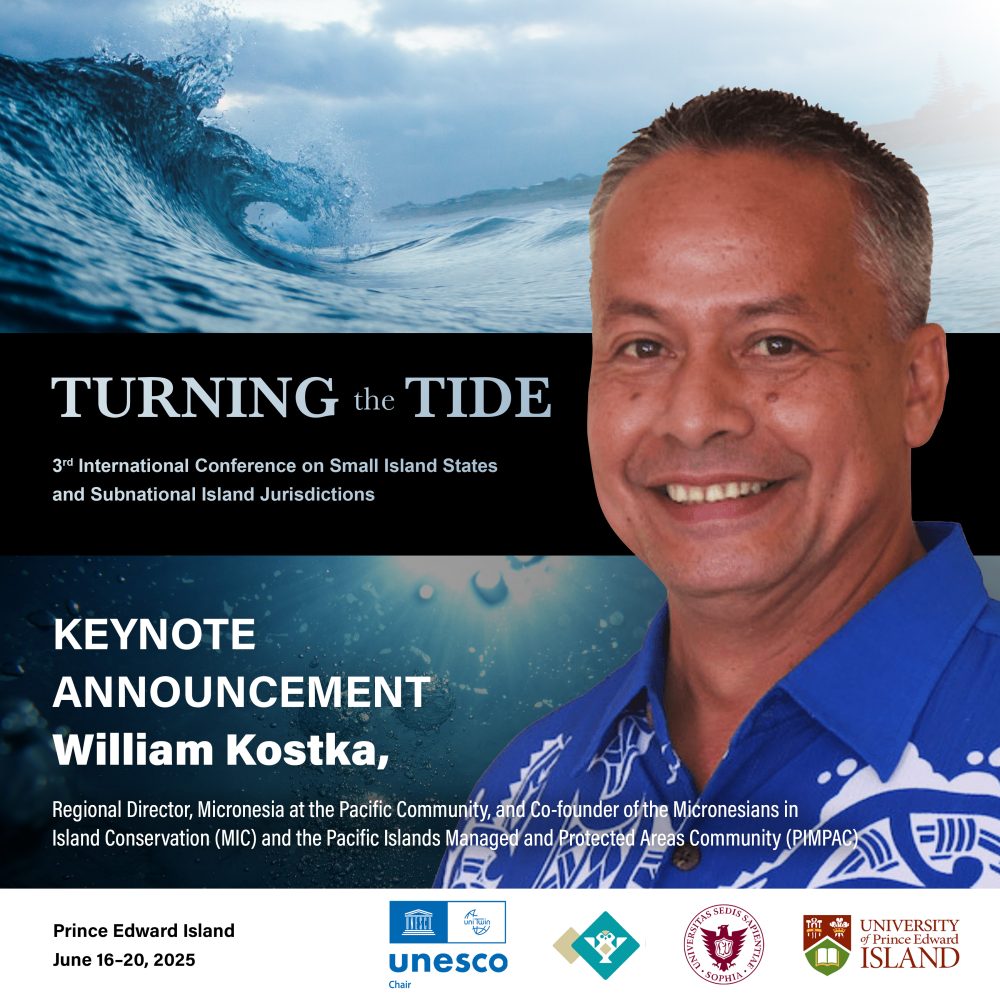
Click Here to Learn More!
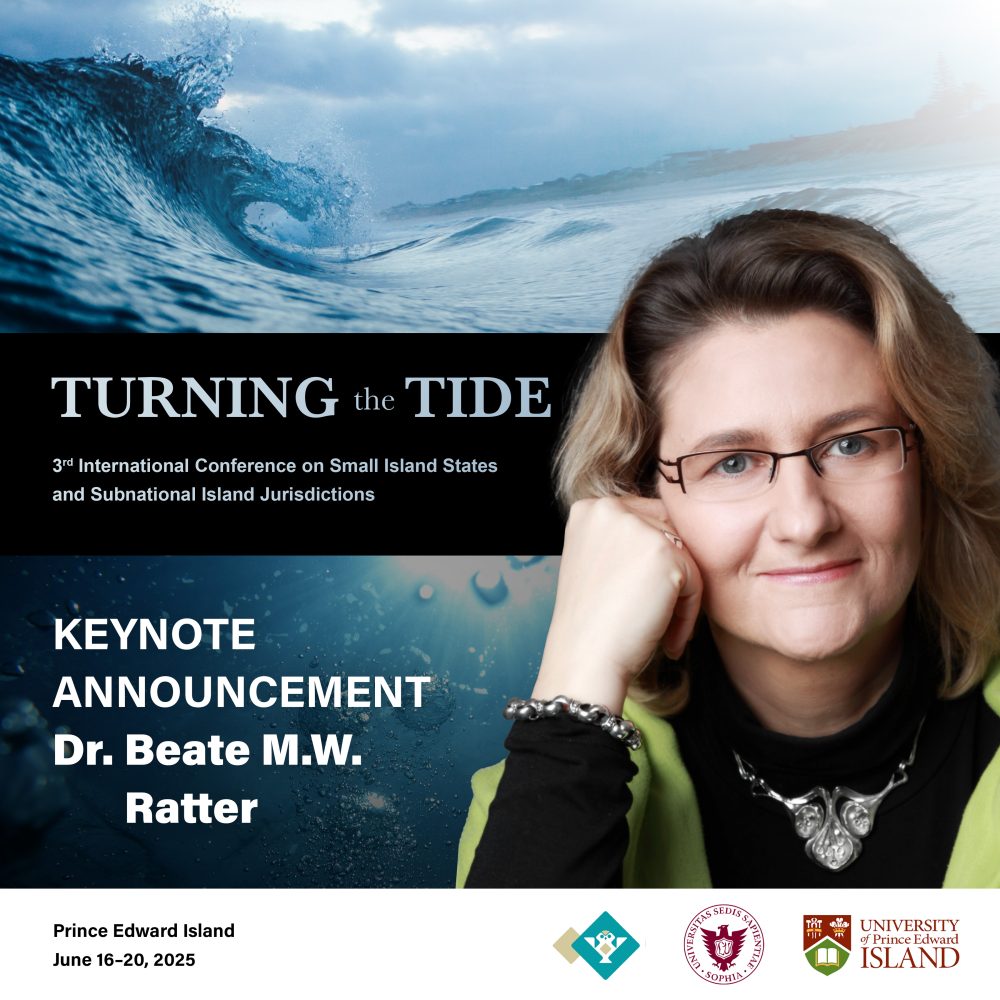
Click Here to learn more!
Draft Program
We are pleased to announce that we have finalized a draft program. Our current program includes the start and end times of planned concurrent sessions, keynote speakers (soon to be announced), plenary panels, workshops, artist showcases, and more! Click Here to view.
Note: If you are a presenter who’s had their abstract accepted to attend our conference, please register ASAP to confirm your spot within our program.
Click Here to read more.
Travel & Accommodations

Getting to PEI
Visa & electronic Travel Authorization (eTA)
Conference attendees traveling internationally may need a Visa or electronic Travel Authorization in order to enter Canada. Please visit the link below to determine what you need in order to travel to Canada.
https://www.canada.ca/en/immigration-refugees-citizenship/services/visit-canada/business/visitors-events-conferences.html
Air
You can fly non-stop to Charlottetown Airport (YYG) from Toronto, Montreal and Ottawa year round, and seasonally from Calgary and Edmonton. For more flight options, consider flying into Nova Scotia’s Halifax Stanfield International Airport (YHZ) and renting a car to complete the three hour drive from Halifax airport to PEI over the 12.9km long Confederation Bridge.
Alternatively, Maritime Bus can take you to Charlottetown from Halifax airport or from other destinations in Nova Scotia and neighboring New Brunswick.
Land
Visitors travelling from Canada’s other maritime provinces (New Brunswick or Nova Scotia) can reach PEI by travelling over the Island’s 12.9 km long Confederation Bridge.
Visitors will have to pay when leaving the island. Toll prices are listed below.
| Vehicles | |
| First 2 axles | $50.25 |
| Each additional axle | $8.50 |
| Motorcycle | $20.00 |
Water
Another classic island option is to take the Northumberland Ferry from Caribou, Nova Scotia to Wood Islands, PEI. The ferry ride is approximately 75 minutes long. Once you have arrived in Wood Islands, PEI, it is another 45 minute drive to Charlottetown.
Visit ferries.ca for details on schedule, fares, amenities and to book online.
Staying in PEI
On-Campus Residence
There are a limited number of pre-booked rooms available in our campus residence buildings. Please e-mail turningthetide2025@gmail.com for booking information.
Hotels
There are many hotel options in the Charlottetown area, all within a 10 – 15 minute drive of the University, and with transit options nearby. See below for popular options:
Hampton Inn & Suites
The Holman Grand Hotel
The Arts Hotel
Delta Hotels
The Hotel on Pownal
Rodd Charlottetown
Rodd Royalty
Holiday Inn Express
Airbnb
Airbnb operates as an online marketplace for short-and-long-term homestays and experiences in various countries and regions. It acts as a broker and charges a commission from each booking.
VRBO
Similar to Airbnb, VRBO is an online marketplace for vacation rentals.
Getting Around PEI
Car Rentals
In order to experience all that PEI has to offer, we recommend renting a vehicle for the duration of your stay in PEI. Below is a list of all on-site car rentals available at the Charlottetown Airport (YYG). We recommend booking in advance.
Another option for car rentals is Turo, a carsharing company that offers a variety of pickup options.
Public Transportation
T3 Transit provides bus services regularly within Charlottetown, and between Charlottetown, Stratford and Cornwall. Bus fare is $2.00 CAD per person, ticket booklets (10 tickets for $18.00 CAD) can also be purchased at the UPEI bookstore.
Please visit https://www.t3transit.ca/ for more information on bus fares and schedules.
Below is a map showing all available bus routes within Charlottetown.
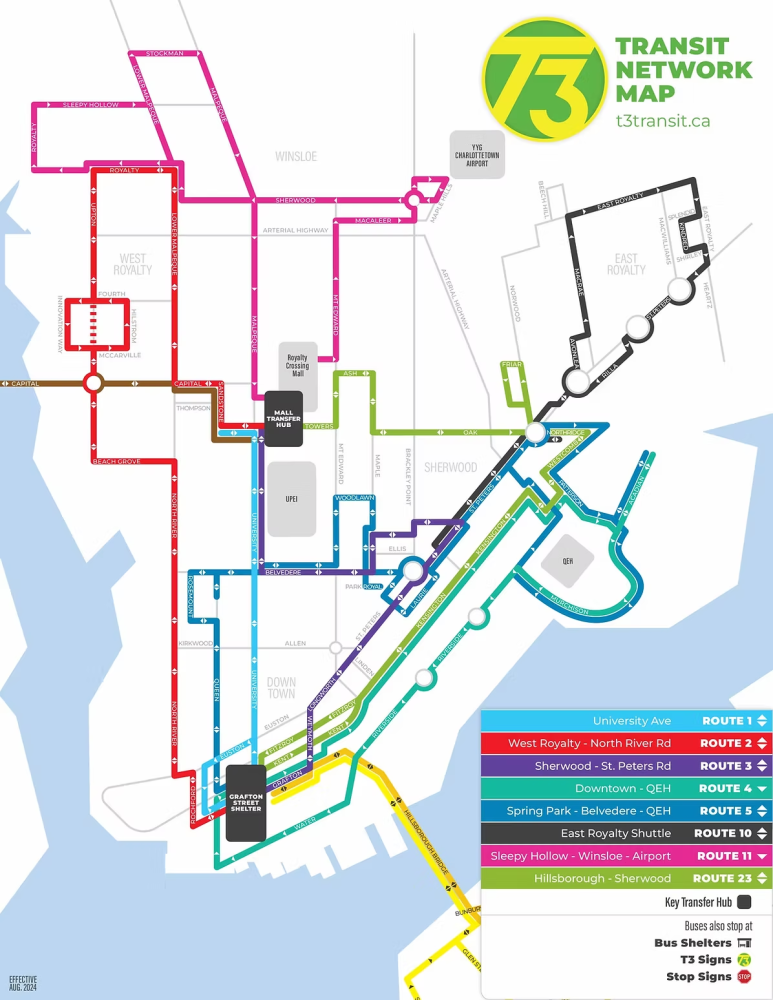
Taxis
Yellow Cab
Local Phone: 1-902-566-6666
Website: www.peiyellowcab.com
Email: info@yellowcabpei.com
Co-op Taxi
Local Phone: 1-902-628-8200
Website: www.cooptaxiline.com
Email: taxi@cooptaxiline.com
City Taxi
Local Phone: 1-902-892-6567
Website: www.citytaxipei.com
Email: contact@citytaxipei.com
GrabbaCab
Local Phone: 1-902-892-6000
Website: www.grabbacab.ca
Email: grabbacab@bellaliant.net
PEI Online Taxi
Website: www.peionlinetaxi.ca
Email: info@peionlinetaxi.ca
Speakers
We are incredibly pleased to present our four keynote speakers for Turning the Tide 2025!


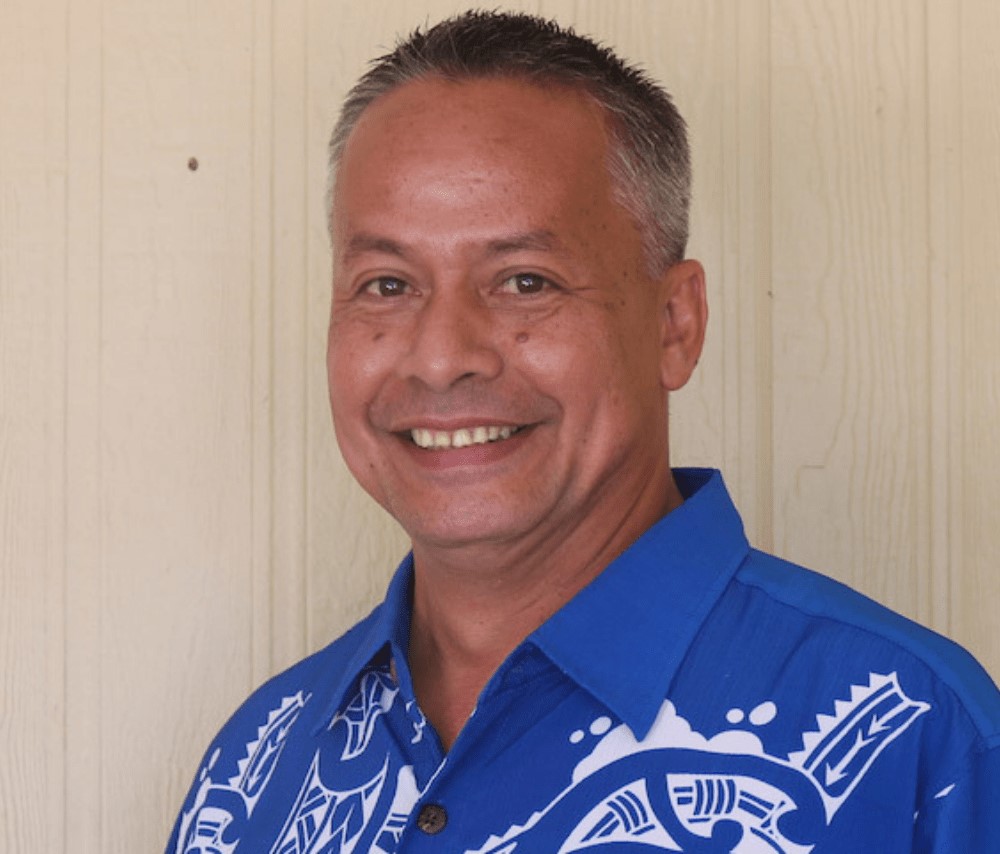

Vandana Singh – Archipelagos of the Imagination: Confronting the Polycrisis

Vandana Singh is a professor of Physics and Environment at Framingham State University in Massachusetts. For the last fifteen years she has been working on a transdisciplinary, justice-centered pedagogy of climate change, which is the subject of her 2024 book, Teaching Climate Change: Science, Stories, Justice. Vandana leads the Education Working Group of My Climate Risk, an initiative of the World Climate Research Programme. She is also a writer of speculative fiction.
Read the abstract for Dr. Singh’s Keynote address here.
William Kostka

William N. Kostka is a leading Pacific conservationist with over 25 years of experience in environmental sustainability and strategic leadership. He has held senior roles at the Conservation Society of Pohnpei, the Micronesia Conservation Trust, and the Pacific Community, where he has led key regional initiatives such as the Micronesia Challenge, the Micronesia Shark Sanctuary, and Blue Prosperity Micronesia. As co-founder of the Micronesians in Island Conservation and the Pacific Islands Managed and Protected Areas Community, he has strengthened peer learning and conservation capacity across the region. He also launched the Micronesia Conservation Trust Endowment Fund (USD $20+ million) and helped develop funding strategies with Oceans5/Waitt Institute and Margaret A. Cargill Philanthropies. His contributions have been recognized with the Pew Marine Fellowship and other major environmental awards.
Dr. Beate Ratter – Islands’ Place and Space: A Geographer’s View on Climate Change in Small Islands

Read the abstract for Dr. Ratter’s Keynote address here.
Dr. Therese Ferguson – Climate Change Adaptation for Small Island States: Education, Visioning and Community Action as Critical Components

Therese Ferguson, PhD is a Senior Lecturer in Education for Sustainable Development (ESD) in the School of Education (SOE) at The University of the West Indies (Mona Campus, Jamaica). Read the abstract for Dr. Ferguson’s Keynote address here.
Dr. Ferguson serves as the Programme Leader for Change from Within, a school-based initiative in Jamaica that addresses violence and indiscipline through school culture change, which is implemented by the SOE. She is also the Coordinator of the ESD Working Group within the SOE, and serves as Programme Coordinator for the Master of Education Degree Programme in Education for Sustainable Development, Global Citizenship and Peace within the SOE. Her research interests lie in ESD, peace education, climate change education, qualitative research, and early-career researcher development.
Her publications include two co-authored books: Education for Sustainable Development in the Caribbean: Pedagogy, Processes and Practices and SDG4 – Quality Education: Inclusivity, Equity and Lifelong Learning for All. She also served as a Guest Editor for a Special Issue of Environmental Education Research on Environmental and Sustainability Education (ESE) in the English-speaking Caribbean. Additionally, her work has been published in peer-reviewed journals such as International Journal of Sustainability in Higher Education, Environmental Education Research, Journal of Geography in Higher Education, Geography Compass, Southern African Journal of Environmental Education, The Qualitative Report, Caribbean Journal of Education, Social and Economic Studies, and the Journal of Education and Development in the Caribbean. Dr. Ferguson currently serves as a member of the Advisory Group for the Global Environmental Education Partnership (GEEP).
Community Tour
Join us on Monday, June 16th for a trip to the beautiful town of Victoria. We will start the morning with a walking tour of the town, followed by lunch at one of the many waterfront restaurants in Victoria. In the afternoon, attendees will have the choice of attending one of three different workshops put on by other conference delegates! For a sneak peek at what workshops will be available, click here.

The Intersection of Culture & Climate on Prince Edward Island
Angela Rowlings
Work on your photography techniques during the Turning the Tide Photo Walk with photojournalist Angela Rowlings in picturesque Victoria by the Sea. Angela will guide participants in a stroll around the small fishing village and answer questions to improve your photography skills. All skill levels and types of photography equipment welcome, from cell phone cameras to DSLRs! It’s recommended to wear comfortable shoes and weather-appropriate clothing.
Drawing Shifting Grounds: A Memory Mapping Workshop at Victoria Beach
Emma Rath
This field-based drawing workshop, led by Emma Rath, extends her conference paper on the material culture of Sable Island into a participatory, site-responsive practice. Held on the intertidal sands of Victoria Beach, participants will engage in intuitive and observational memory mapping to explore the entanglement of personal experience, ecological fragility, and coastal change.
Through drawing, note-making, and guided reflection, the shoreline becomes both subject and surface, mirroring the shifting boundaries between land and sea, human and non-human, presence and disappearance. Inspired by Rath’s research, grounded in fieldwork, archival material, and lived experience. This session invites participants to consider how embodied practices can offer alternate ways of documenting and interpreting coastal landscapes in flux.
Poetry, Nature, and Climate: A Workshop
Adam Beardsworth
New Materialist philosophy views objects, or “things” as autonomous and independent of human manipulations or anthropocentric ideas. It seeks wonder and enchantment in the material world as an antidote to the hyper-rationality of modern life. The philosopher Jane Bennett uses the term “vital materialism,” or “thing power” to consider how ordinary objects have forces, propensities, and even agency, of their own. For New Materialists like Bennett “things,” or actants, interact with all other things in “assemblages” that produce the world around us, a view that displaces more conventional notions that position humans at the centre of all things.
The purpose of this workshop is to explore Thing Power in poetry writing. Participants will beachcomb for “vibrant matter,” and will then respond in writing to a series of prompts about their objects. These exercises will produce raw material for the construction of object-oriented poems that demonstrate how art and the natural world form a creative assemblage. These poems will help show the importance of patiently understanding the non-human world in the formation of ecologically-minded art.
Conference Dinner
Join us on Wednesday, June 18th, for an evening of fun, food and live music at our conference dinner, hosted at the Canadian Centre for Climate Change and Adaptation in St. Peters Bay!
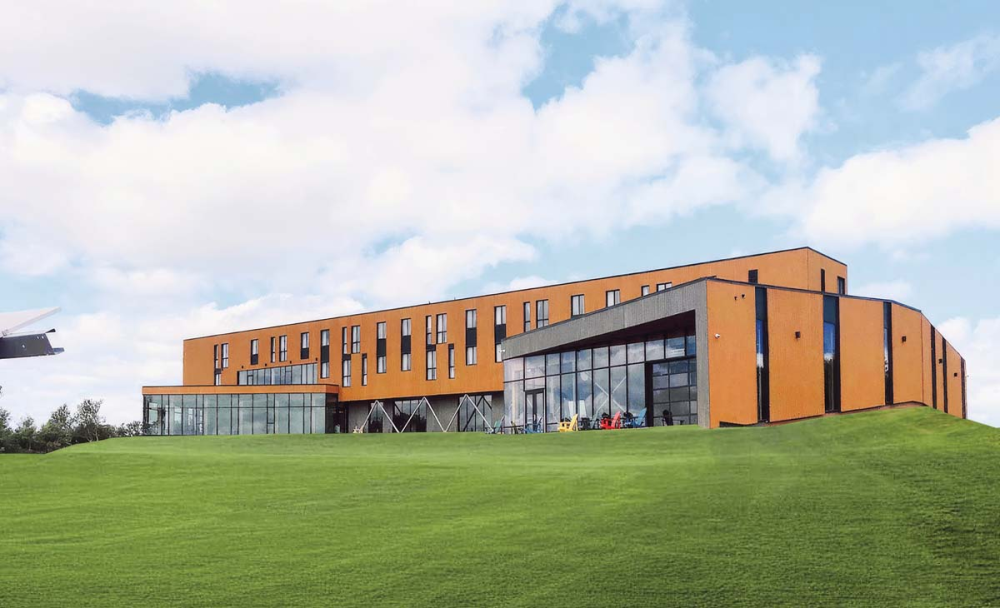
The dinner will take place from 5:30pm – 8:30pm, and will include locally sourced seafood, cooked on site by local fishers and restaurant owners. There will also be burgers, salads, rolls and more, all made fresh and locally on PEI.
Transportation to and from the dinner will be available, with a bus leaving UPEI at 4:30pm, and returning at 8:30pm. Tickets are available at this link. We hope to see you there!
Program & Schedule
Book of Abstracts
Student Profiles
We are pleased to share interviews done with students from UPEI’s Master of Arts in Island Studies program! Read below to see what students are looking forward to with Turning the Tide 2025!
Marlene Chapman – Graduate, Master of Arts in Island Studies
Can you share your journey to study Island Studies? What sparked your interest in this unique field?
I completed a business degree many years ago and spent a couple of decades working in various roles, particularly in the non-profit sector. During that time, it became clear to me that effective social programs and services rely heavily on good policy. This realization sparked my interest in policy development, which ultimately led me to study Island Studies. I’m particularly drawn to the transdisciplinary nature of the program, as it allows me to explore various fields and their intersection with island communities.
Islands have such diverse and rich cultures. What fascinates you the most about islands, and how has it shaped your perspective?
Being an islander myself, I have a strong sense of identity that comes from that experience. Islands attract people for many reasons, whether it’s their unique cultures or sense of community. This connection has profoundly influenced my perspective, motivating me to explore these dynamics in my studies.
What motivated your choice of studies, and how does it connect to your background experiences?
My motivation is closely tied to my previous answer. My background in business and my extensive experience in the non-profit sector have highlighted the importance of policy in social programs. This connection drives my interest in studying Island Studies, as I aim to understand how policies can better support island communities.
We’d love to hear about your research paper presentation. What is the core theme, and what insights do you hope to share with the audience?
My thesis focuses on adaptive capacity in the face of climate change, specifically through a case study of fishermen and how they collaborate to adapt. I’m exploring the role of social capital and its impact on adaptive capacity. While the theoretical link between social capital and adaptive capacity in groups isn’t new, there hasn’t been much research on it, especially in the context of climate change. I hope to shed light on these connections and contribute to a deeper understanding of how communities can navigate environmental challenges.
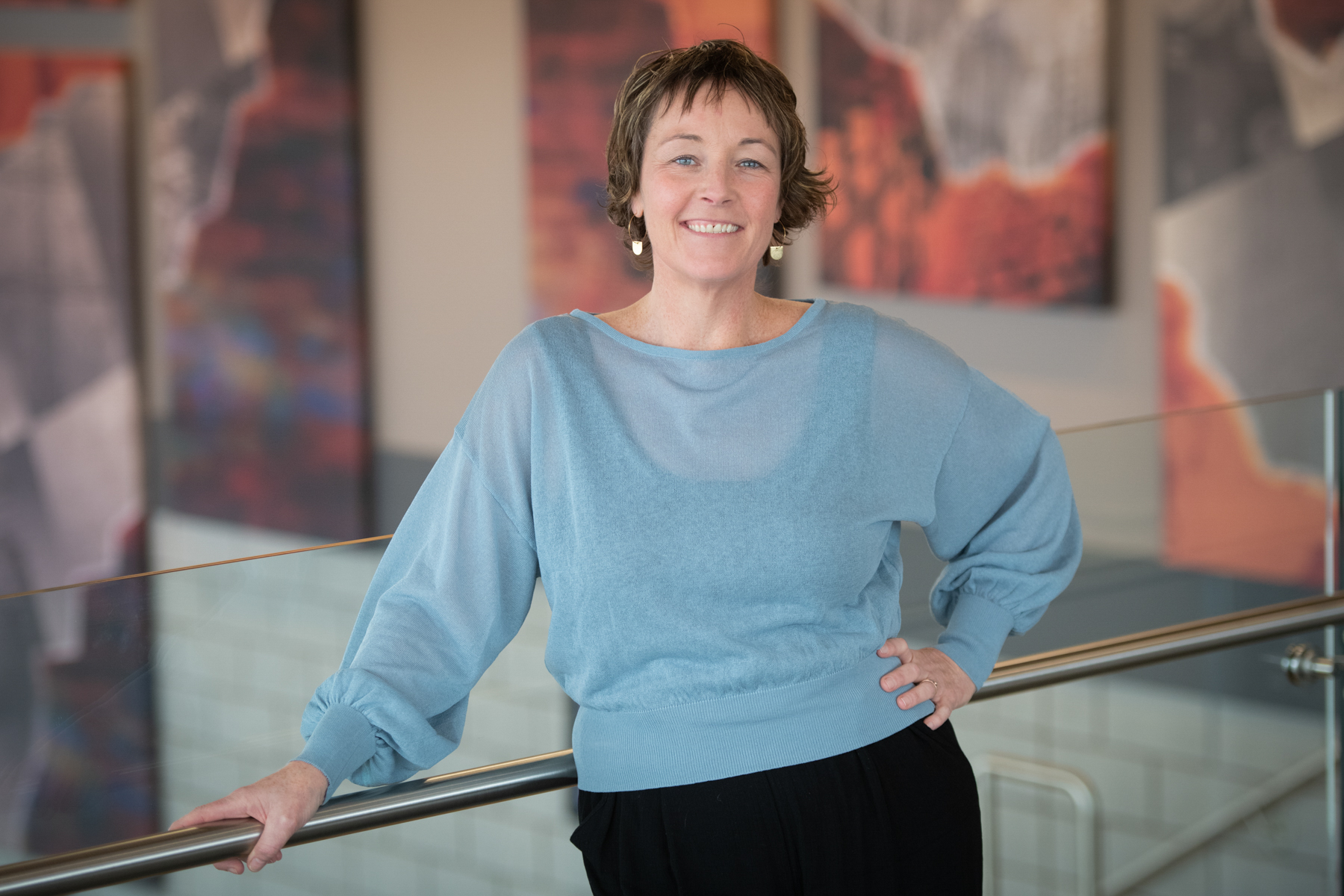
Call for Abstracts (Closed)
Our call for abstracts is now closed!
Download the call for abstracts here, or read below
CALL FOR ABSTRACTS:
We invite researchers, practitioners, artists, and communities across disciplines to explore island imaginaries and interdisciplinarities in the context of climate change. Recognizing that climate change is profoundly cultural and that island imaginaries wield discursive power and material effects, we seek insights from different perspectives such as arts, humanities, social sciences, and climate (and other) sciences.
Islands have long evoked imaginative responses that informed the ways they have been conceptualized, researched, represented, colonized, and deployed by Western-scientific-economic interests. With climate change, new island imaginaries are being produced, for example, via data, computer models, visualizations, and dystopic predictions, all of which have material dynamics that forge realities. Islanders have been resisting and critically responding to past and current island imaginaries through research, art, stories, and Indigenous epistemologies. Diverse, decolonizing, and interdisciplinary collaborations that challenge and reconsider how imaginaries and knowledge(s) about islands are produced, valued, disseminated, utilized, and resisted are vital in creating transformative possibilities. Don’t miss the opportunity to present your work at this vibrant and collaborative forum, bringing together island scholars from around the world and across various disciplines. Submit an abstract related to one or more of the sub-themes:
- Food sovereignty in an era of climate change
- Ocean health and climate change (ecosystem functionality, terrestrial, ocean, ecotone)
- Incorporating diverse knowledges in climate change adaptation strategies
- The importance of health and well-being
- Material culture: lived experiences of the everyday
- Climate and social justice
- Gender and intergenerational framing
- Environmental law and governance
- Migration and urbanization
- Nature-based solutions
- Climate change communications
- Climate change education
This conference aims to share stories. We therefore encourage academic papers, panels, roundtables, posters, and non-traditional presentations (e.g., storytelling, interactive sessions, creative) from all disciplines. In addition to scholarly papers, we also invite submissions for:
- Artist in residence / Poet in residence
- Creative pieces that engage with the themes
- Workshops on sharing creative practices (e.g., poetry, art, photography, storytelling)
- Indigenous practices and workshops
- Experiential learning activities
We welcome submissions that look at the dynamics of climate change, island imaginaries and the imperative of interdisciplinary research on a case-by-case, island-by-island, or regional basis. All disciplinary perspectives are welcomed, but they must engage with notions of the lived experience of islandness. We are also keen to engage with presentations that adopt a more comparative framework or methodology in their critical analysis.
Abstracts of around 150-200 words each are invited on any of the above themes. Although this is primarily an in-person event, we will accommodate those who choose not to travel with a parallel stream made available to participants online. Please indicate in the Abstract Submission Form if you prefer this mode of delivery. Registration fees will be adjusted accordingly.
Partners & Sponsors
More information coming soon!
Volunteer
More information coming soon!
FAQs
Is it possible to attend the conference online?
Yes! Check back in early 2025 for our online tickets and rates!
Is it possible to attend the conference just for one day?
Yes! In early 2025, we will provide information about each day and the activities planned. Depending on programming, prices may vary.
What different conference events can I sign up for?
Our program committee is busy creating some exciting activities for attendees and their travel partners, in addition to the opening reception and organized tours. Watch this page and our conference website for details and costs.
Where can I stay?
UPEI residences have been blocked off for conference attendees at reduced rates. Individual and shared accommodations will be available. Conference attendees can also stay at many of the hotels in downtown Charlottetown, and the surrounding area, or take advantage of Airbnb and VRBO options.
What is the weather like in Charlottetown in June?
Summers in PEI are usually beautiful and sunny. Temperatures can range between 15 to 25 degrees celsius. However, please consider the theme of this conference to be a disclaimer on the variability of weather patterns on islands!
Please visit Environment Canada for up-to date weather forecasts.
How easy is it to get around PEI?
There is a transit system that services Charlottetown regularly, and provides connectivity to other areas surrounding Charlottetown. Taxis and a ride-share option (Kari) are also options. If you want the freedom to explore the Island on your own time, we strongly recommend renting a vehicle.
Whom do I contact if I have other questions?
Please write to us at turningthetide2025@gmail.com and Frieda, Tristan, or Pooja will be happy to get back to you with answers. And don’t forget to keep a lookout for the most up-to-date information on: https://projects.upei.ca/unescochair/turningthetide2025/
What is the ticket refund policy?
Please write to us at turningthetide2025@gmail.com and Frieda, Tristan, or Pooja will be happy to get back to you with answers.
Contact Us
For more information, please email: turningthetide2025@gmail.com
Contacts:
Tristan Atkins, Conference Assistant, Institute of Island Studies.


